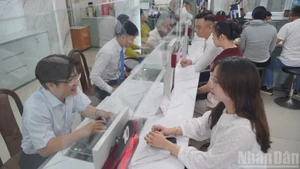The retail market was previously considered the playing field of foreign investors, but now domestic retailers are overturning the situation and reclaiming their shares.
With an expected increase in size to US$350 billion in 2025, which is 1.6 times higher than in 2020, the Vietnamese retail market is expected to open new opportunities for domestic enterprises to seize in conquering the market.
More than ten years ago, the Vietnamese retail market saw an investment wave of foreign companies through M&A deals and new investment. With strengths in finance and administration, foreign firms caused their domestic peers to face a great deal of challenges in occupying market share.
According to retail experts, domestic enterprises have potential but are weak in administration and lack cooperation, so they were unable to create a common strength. After a period of struggle, some strong domestic companies such as Phu Thai and Nguyen Kim had to sell themselves to foreign competitors at cheap prices. The picture of Vietnam’s retail sector was a grey colour with more than 50% of shares belong to foreign companies.
The situation has started to reverse in the past five years when domestic giants such as Vingroup, Masan and Bach Hoa Xanh have managed to conquer the market. Such enterprises have penetrated deeply into the retail market to gradually acquire the dominant share. This has forced many foreign retailers to retreat from Vietnam despite having had ambitious plans.
Most recently, Lotte Mart Dong Da (belonging to the Korean group Lotte) announced cease of operation after eight years. The move shows that the company is planning to narrow its business in Vietnam since its first presence 13 years ago. It originally planned to open 60 shopping malls throughout the country by 2020 but the figure now is just 14.
Domestic firms are also silently expanding through M&As such as the case of the Korean brand E-mart, which announced termination of business in Vietnam and transferred its megamall in Ho Chi Minh City to Truong Hai.
Lotte Mart and E-mart are not the first foreign companies have resigned to narrowing their business or retreating from the Vietnamese market. Even major names such as Auchan, Big C, Metro and Shop & Go had to admit that the Vietnamese retail market is not easy to conquer despite having a great deal of potential.
With the advantage of home turf and understanding of local consumers’ taste, domestic enterprises are gradually encroaching on the market and expanding their networks. Vincom Retail, for example, is possessing more than 80 commercial centres throughout Vietnam, with no competitors in this segment. The retail chain Vinmart and Vinmart+ currently has 125 large supermarkets and nearly 3,000 convenience stores after being transferred from Vingroup to Masan. Saigon Co-op is also undergoing significant changes with the ambition to double its outlets to at least 2,000 by 2025.
Alongside reclaiming the market share from foreign enterprises, the competition between domestic enterprises is also very intense. Since the onset of COVID-19, enterprises are employing new methods to approach consumers, with many focusing on online payment and express delivery.
According to Dinh Thi My Loan, the honorary president of the Vietnamese Retailers Association, the key to maintaining their shares is catching new trends and adapting their business strategies to consumer behaviour. Besides sustaining physical stores, they need to look for new opportunities, especially as the pandemic remains complicated.
The development of multi-channel retail, aimed at interacting with consumers anywhere and anytime to make the shopping experience uninterrupted, is the inevitable trend of the future. In order to continue promoting online shopping, retailers need to enhance their professionalism from order processing and delivery to payment in order to better meet the needs of consumers.
















